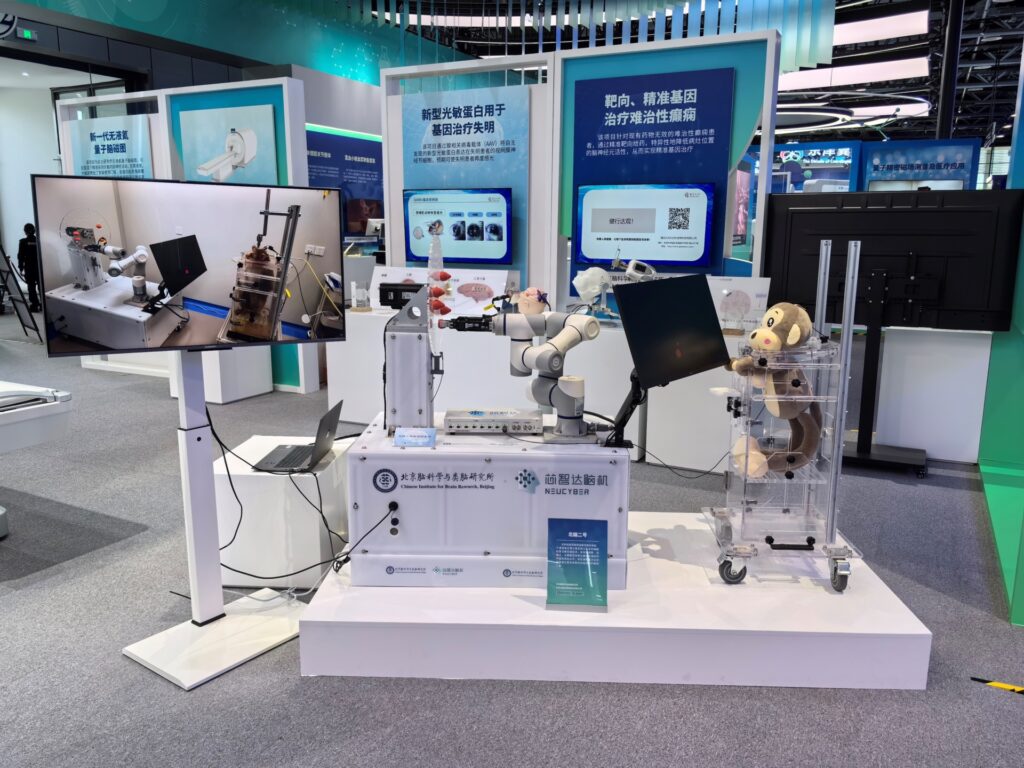Chinese state media on Tuesday highlighted a Chinese-developed competitor to Elon Musk’s Neuralink technology, a brain-implanted chip that allows human interaction with electronics.
Global Times reporters observed a “magical scene” where a monkey with a Neucyber chip displayed brainwave signals on a computer monitor.

The Neucyber Array BMI System, China’s self-developed brain-machine interface BMI system, showcased at the 2024 Zhongguancun Forum opening ceremony in Beijing, China on April 25, 2024. (Xinhua via Getty Images)
The project leaders explained that the chip has been implanted in the monkey’s skull for nearly a year and continues to gather high-quality signals. The next phase involves creating an algorithm to interpret the brainwaves, potentially enabling the monkey to manipulate a robot arm. Success in this phase could lead to human trials within a year.
The Global Times elaborated:
The advanced algorithm is a significant step towards achieving neurally controlled prosthetics that are more human-like, natural, and flexible for patients in the future. The team announced that researchers are preparing to publish academic papers on the advanced algorithm-powered Neucyber.
China’s interest in Neuralink surged after Musk revealed the first brain-computer interface (BCI) in January. Within a month, the Chinese Ministry of Science and Technology issued “ethical guidelines” to support “clinical trials of innovative BCI products.”
As typical with the Chinese Communist Party, these “ethical guidelines” were laden with loopholes and exceptions, virtually authorizing Chinese scientists to take any measures necessary to rival Western scientists.
The Global Times expressed confidence in China’s ability to mobilize “superior resources” to not only catch up but potentially surpass in BCI technology, proudly mentioning that Neucyber was developed in under a year. The communist regime considers BCI a critical “cutting-edge emerging technology.”
“Industry observers believe that since BCI technology is not yet widely utilized as medical devices globally, China still has the opportunity to commercialize its BCI products ahead of the U.S.,” noted the Global Times.
CFOTO/Future Publishing via Getty Images
Neuralink has faced significant challenges. The functionality of the BCI implant in the first patient, 30-year-old quadriplegic Noland Arbaugh, deteriorated by nearly 85 percent after the initial hundred days, as many of the ultra-thin electrode threads were apparently rejected by his brain tissue.
Despite setbacks, Neuralink is pushing for a second human trial with a deeper brain implant, and Arbaugh remains a staunch supporter of the technology, which allowed him to interface mentally with computer systems effectively enough to play video games before his implant’s degradation. He even set a world record for precise computer cursor control, a feat likely of interest to Chinese medical ethicists who argue for loosening research restrictions if BCI proves “superior to human capabilities.”
Arbaugh retains limited computer interface abilities and has expressed a desire for another surgery to fix or replace his implant, though Neuralink doctors have advised against it.